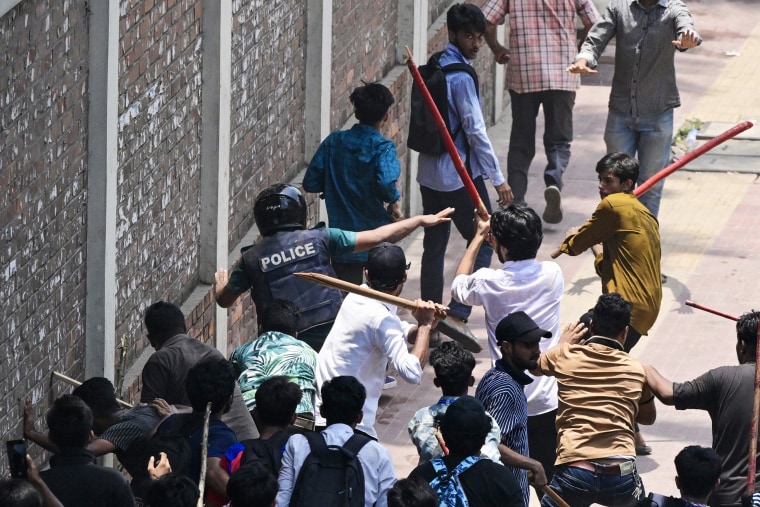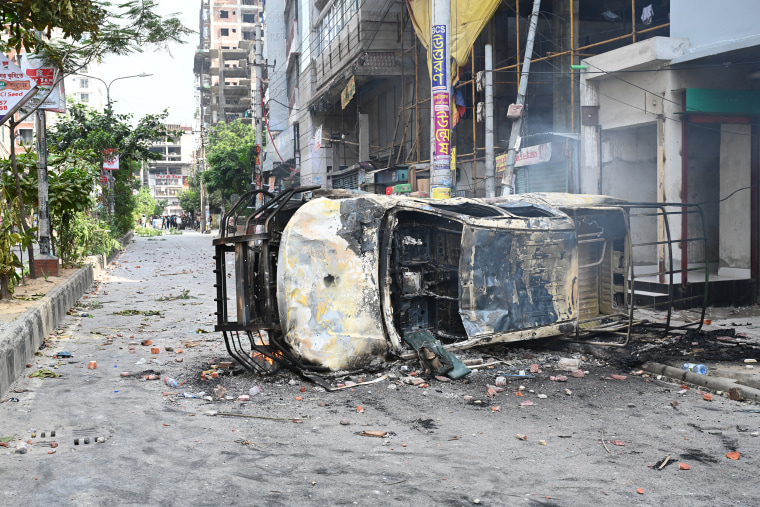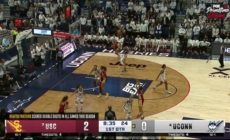-
Ohio State, Ryan Day silence critics with resounding win over Tennessee - 4 mins ago
-
America’s Most Popular Christmas Movies Revealed - 32 mins ago
-
Jackie Kennedy ignored Maria Callas’ affair with husband Aristotle Onassis: pal - 44 mins ago
-
Lamar Jackson on Ravens' win over Steelers and clinching the playoffs – 'It feels good' | NFL on FOX - 49 mins ago
-
Yankees Likely To Sign Alex Bregman Following Paul Goldschmidt Deal - about 1 hour ago
-
The Circle of Light Closes and Illuminates the World - 2 hours ago
-
Texas, fueled by adversity and last year’s CFP loss, tops Clemson in playoff opener - 2 hours ago
-
College Football Playoff: Texas Eliminates Clemson, Will Play Arizona State in Peach Bowl - 2 hours ago
-
Juju Watkins drills a 3-pointer over Paige Bueckers, extending USC’s lead over UConn - 2 hours ago
-
How To Get Your Steps in Over the Holidays, According to Personal Trainers - 3 hours ago
Bangladesh suspends internet after 28 killed in deadly protests
Police and security officials fired bullets and tear gas at protesters in Bangladesh on Friday, as internet and mobile services were cut off after days of deadly clashes over the allocation of government jobs.
The protests, which began weeks ago but escalated sharply on Monday, represent the biggest challenge to Prime Minister Sheikh Hasina since she was won a fourth consecutive term in a January election that was boycotted by the main opposition parties.
The fresh clashes follow the bloodiest day of the protests to date, with local media reporting 22 people killed as protesting students attempted to impose a “complete shutdown” on the country.
The chaos has highlighted cracks in Bangladesh’s governance and economy and the frustration of young graduates who face a lack of good jobs.
An Associated Press reporter saw border guard officials fire at a crowd of more than 1,000 protesters who had gathered outside the head office of state-run Bangladesh Television, which was attacked and set on fire by protesters the previous day.
The border guards shot at the right crowd with rifles and sound grenades, while police officers fired tear gas and rubber bullets. Bullets littered the streets, which were also marked by smears of blood.
A news producer and reporter at Bangladesh Television on Thursday told the Associated Press that protesters had broken through the main gate and set fire to vehicles and the reception area. They spoke on condition of anonymity for fear of reprisals.
“I escaped by leaping over the wall but some of my colleagues got stuck inside. The attackers entered the building and set furniture on fire,” the producer said by phone.
At least 22 people were killed on Thursday, a local TV station reported, following six deaths earlier this week. Authorities could not be reached to immediately confirm figures for the deaths.
On Friday morning, internet services and mobile data appeared to be down in the capital, Dhaka, and social media platforms like Facebook and WhatsApp were not loading.
A statement from the country’s Telecommunication Regulatory Commission said they were unable to ensure service after their data center was attacked Thursday by demonstrators, who set fire to some equipment. The Associated Press has not been able to independently verify this.
Student protesters said they will extend their calls to impose a shutdown on Friday as well, and urged mosques across the country to hold funeral prayers for those who have been killed.

The protesters are demanding an end to a quota system that reserves up to 30% of government jobs for relatives of veterans who fought in Bangladesh’s war of independence in 1971 against Pakistan.
They argue the system is discriminatory and benefits supporters of Prime Minister Sheikh Hasina, whose Awami League party led the independence movement, and they want it replaced with a merit-based system.
But Hasina has defended the quota system, saying that veterans deserve the highest respect for their contributions in the war regardless of their political affiliation.
The Bangladeshi leader is credited for bringing stable growth to Bangladesh, but rising inflation — thanks in part to the global upheaval sparked by the war in Ukraine — has triggered labor unrest and dissatisfaction with the government.
Even though job opportunities have grown in some parts of the private sector, many people prefer government jobs because they are seen as more stable and lucrative. But there aren’t enough to go around — each year, some 400,000 graduates compete for around 3,000 jobs in the civil service exam.
“What is unfolding in Bangladesh is deeply unsettling for a generation that only asked for a fair opportunity in public service recruitment. That a peaceful protest against a state policy would slip into the peak of lawlessness shows the government’s lack of farsightedness and inefficient policy governance,” said Saad Hammadi, policy and advocacy manager at the Canada-based Balsillie School of International Affairs who has advocated for freedom of speech in the country.
“The internet shutdown makes matters worse. Local news sites are inaccessible, and people in the country are left incommunicado with the rest of the world all in the pretext of conducting sweeping operations by the state that have often resulted in serious human rights violations,” he added in an email.

Bangladesh has previously shut down internet services in areas affected by protests, using it as a measure to suppress dissent by opposition parties, according to Access Now, an internet watchdog.
CIVICUS, a nonprofit that tracks civic freedoms around the world, last year downgraded Bangladesh to “closed,” the worst rating that it could assign, along with China and Venezuela, following a crackdown on the country’s opposition members and supporters ahead of its national election.
The main opposition Bangladesh Nationalist Party has backed the protesting students and is expected to hold demonstrations to show their support. Hasina’s party has accused them of stoking the violence, raiding the BNP’s headquarters and arresting activists from the party’s student wing earlier this week.
The Awami League and the BNP have often accused each other of fueling political chaos and violence, most recently ahead of the country’s national election, which was marred by a crackdown on several opposition figures while Hasina’s government accused the party of attempting to disrupt the vote.
Hasina’s government had earlier halted the job quotas following mass student protests in 2018, but last month, Bangladesh’s High Court nullified that decision and reinstated the quotas after relatives of the 1971 veterans filed petitions, triggering the latest demonstrations.
The Supreme Court has suspended that ruling pending an appeal hearing, and said in a statement it will take up the issue on Sunday.
On Wednesday, Hasina urged protesters in a televised address to “wait with patience” for the court verdict. “I believe our students will get justice from the apex court. They will not be disappointed.”
Source link





























